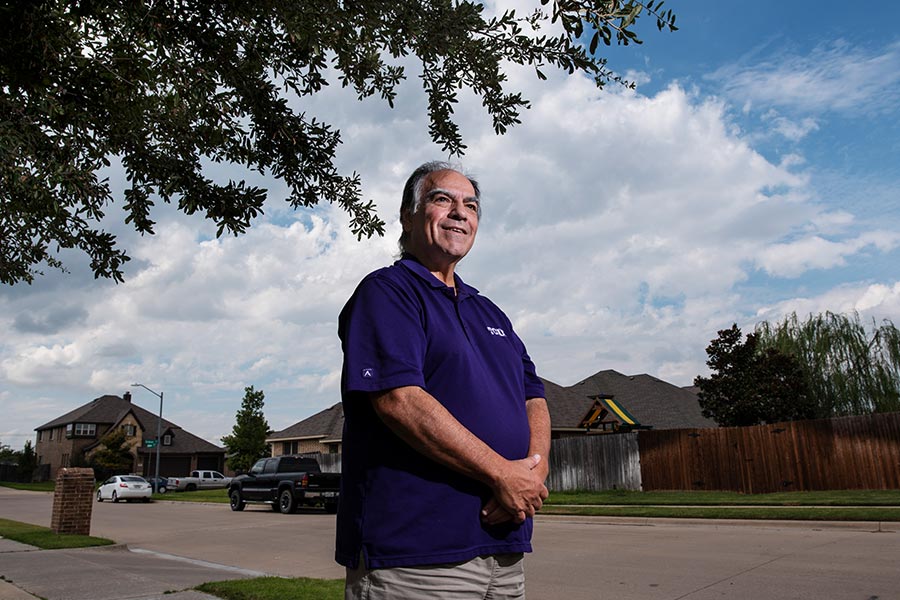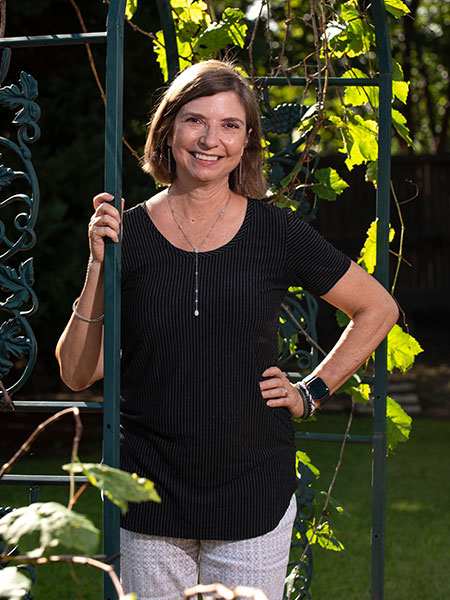God's grace and the power of prayer provide a lifeline in two local organ donations

Liver transplant recipient Ron Holton, 65, stands outside of his home in Burleson, Sept. 15, 2020. Holton, a lifelong parishioner of Holy Family Church, received a liver transplant Sept. 7, 2018 and credits his recovery to "family, faith, and prayer." (NTC/Ben Torres)
FORT WORTH — Family, faith, and prayer are the forces that helped Ron Holton go from receiving a life-threatening diagnosis to receiving a liver transplant in a matter of months. The 65-year-old said he now feels 30, just two years after the gift.
Holton and his family say a thunderstorm on Sept. 6, 2018, saved his life.
The day began as any other for Holton. When he got the call about a possible liver match at 4:30 p.m., he assumed it would be another false alarm. He grabbed a packed overnight bag kept by the front door, and when his son arrived, he hit the road to Baylor Scott & White Hospital in Dallas. During the stormy ride there, a nurse called every 15 minutes to get an estimated arrival time.
Ron Holton’s brother, Deacon Steve Holton, was in the process of diaconate formation and on his way from Dallas to teach an RCIA class at St. Andrew Parish near Texas Christian University. Steve was sitting in traffic on Interstate 30 during the storm, when he received a call from his cousin, a nurse at Baylor Scott & White All Saints in Fort Worth.
“Be careful out there. The storm knocked out power to the entire Baylor hospital network,” she said.
Steve then got the call from Ron, who explained a power outage in Fort Worth resulted in a liver transplant being cancelled. While Ron was heading east, so was a doctor from Fort Worth, driving Ron’s liver to the hospital.
“During my ride from Dallas to Fort Worth, it hit me. ‘The storm allowed my brother to live!’” Steve, now a permanent deacon, said.
After being diagnosed with cirrhosis of the liver in January 2018, the pre-transplant journey was long and rough for Ron, who said at times he wanted to “throw in the towel and give up.” He was told there was no cure and he had three years to live, at most, after diagnosis.
Ron’s health was deteriorating fast.
“I was given [Anointing of the Sick] twice in 2018,” the longtime Holy Family parishioner said. “There were so many dark times.”
In the sacrament of the Anointing of the Sick, a person at some risk of death from illness or old age receives the Holy Spirit’s gift of peace and courage. The sacrament can be administered again if the person’s condition worsens.
It took him eight months and 25 days in the hospital before being placed on the national transplant registry because of numerous health issues including infections, blood disorders, and bone diseases. He even lost his ability to walk. Ron was finally added to the list Aug.15, 2018, and was told the wait could be up to a year or more.
“By the grace of God, I was called three weeks later,” he said.
Ron credits God and the Catholic Church for helping him through the journey.
“Almost three years ago I was told I had 30 days to live. I am called a miracle patient by my doctor,” he said.
Ron said he had prayer warriors on the East Coast, West Coast, and in-between.
“All Catholics,” he said. “If it wasn’t for family, faith, and prayer, I wouldn’t be here.”
Ron said the donor was a 53-year-old male. Writing a letter to his family was hard.
“How do you thank somebody who lost a family member?” he said. “I think about it all of the time.”
Deacon Steve Holton said his deacon formation helped prepare him for his brother’s journey. He spent time in hospice and as a hospital chaplain, witnessing heartbreak and sorrow but learning that sometimes tragedy brings fruit.
“Sometimes God gives us what we need but not always what we want,” he said. “We don’t understand it.”
A donor’s experience
Donna Heim, a St. Ann parishioner in Burleson, didn’t understand a “tug” on her heart while praying for an acquaintance who needed a kidney transplant.
“Maybe I’m supposed to do more than pray,” Heim said, reflecting on her thoughts.

“Am I hearing you right?” she asked God. “Why am I having a sense of being a donor?”
Heim, 62, thought, “What are the chances? I probably will not be a match,” but she reached out anyway.
Heim said she felt the Holy Spirit through the entire process, which included a series of bloodwork and paperwork, and later an eight-hour test in Dallas, where she would undergo more testing and visits with nurses and sociologists.
“I thought if they were going to devote eight hours, this is looking serious,” she recalled.
A week and a half later, Heim found out she was a match for the man, who is also 62.
“When I saw their number come up on the phone, they told me I was a match. I was elated, I wasn’t scared. That had to be the Holy Spirit,” she said. “This was way out of the realm of something I would do.”
Support from her family played a big part in her journey. She said her husband told her, “If you feel that God is leading you in that direction, I don’t want to be the one standing in your way.”
Also playing a big role in preparing her for the surgery was what she learned during a Montserrat silent retreat.
“That was very powerful in preparing me for this. The group all prayed over me,” she said. “I felt the prayers, I felt totally encircled with God’s love.”
That circle of love also was felt on March 3 in the hospital room. Right before the surgery, hospital staff positioned both beds side-by-side while prayers were said.
Heim said recovery went well, and she has no regrets.
“The blessings totally outweighed the discomfort,” she said.
One such blessing is getting a text message from the recipient every third day of the month, “Happy Anniversary.”
Heim said she often reflects on her journals and realizes God has blessed her many times during her life.
“But this was the high point in my spiritual journey,” she said.
